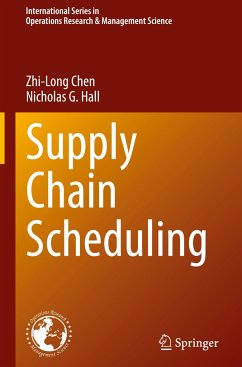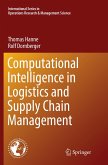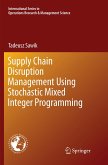Supply chain scheduling is a relatively new research area with less than 20 years of history. It is an intersection of two traditional areas: supply chain management and scheduling. In this book, the authors provide a comprehensive coverage of supply chain scheduling. The book covers applications, solution algorithms for solving related problems, evaluation of supply chain conflicts, and models for encouraging cooperation between decision makers.
Supply chain scheduling studies detailed scheduling issues within supply chains, as motivated by a variety of applications in the real world. Topics covered by the book include:
Coordinated decision making in centralized supply chains, including integrated production and distribution scheduling, joint scheduling and product pricing, and coordinated subcontracting and scheduling. Coordination and competition issues in decentralized supply chains, including conflict and cooperation within scheduling decisions made bydifferent parties in supply chains, and both cooperative and non-cooperative supply chain scheduling games.
The book describes a variety of representative problems within each of these topics. The authors define these problems mathematically, describe corresponding applications, and introduce solution methods for solving each problem to improve supply chain performance.
Supply chain scheduling studies detailed scheduling issues within supply chains, as motivated by a variety of applications in the real world. Topics covered by the book include:
Coordinated decision making in centralized supply chains, including integrated production and distribution scheduling, joint scheduling and product pricing, and coordinated subcontracting and scheduling. Coordination and competition issues in decentralized supply chains, including conflict and cooperation within scheduling decisions made bydifferent parties in supply chains, and both cooperative and non-cooperative supply chain scheduling games.
The book describes a variety of representative problems within each of these topics. The authors define these problems mathematically, describe corresponding applications, and introduce solution methods for solving each problem to improve supply chain performance.
"The book presents an impressive overview of the scheduling theory and practice applied to supply chain models (which are present everywhere!), an extensive reference is given for all the work done in scheduling over more than 60 years ... . It is detailed and presents illustrating numerical examples, it contains several algorithms and NP-hardness proofs, each chapter has a concluding part with further research ideas." (Helmut G. Kahlbacher, zbMATH 1498.90002, 2022)








